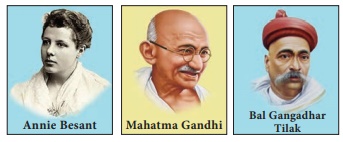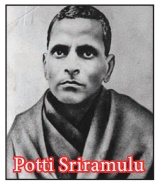Challenges of Nation Building | Political Science - Linguistic Reorganisation of the State | 12th Political Science : Chapter 7 : Challenges of Nation Building
Chapter: 12th Political Science : Chapter 7 : Challenges of Nation Building
Linguistic Reorganisation of the State
Linguistic Reorganisation
of the State
Pre-Independence
Even before independence, the
linguistic vibrancy of the land had a significant impact on mobilising
movements and protests during the freedom struggle. Hence, the restructuring of
the States based on vernacular languages was of strategic importance in
integrating the States as one nation. In fact, when Annie Besant initiated the
‘Home Rule Movement’, there were more participants from the Southern region.
The plan for linguistic
re-organisation began in 1917 by the Congress party; plans to redistribute the
provinces on linguistic basis came to the fore and by the 1920s, there were
expressions on the need to acknowledge vernacular languages for administration
and formal education. In fact, many regional Congress members also insisted on
linguistic provincials, especially the Andhra Provincial Congress Committee
consolidated the Telugu speaking districts from the Madras Presidency in 1917.
Noticing the rising demand for a linguistic assertion, the process of re-
distribution of provinces began in 1927. After a long struggle that began in
1895, to separate from Bihar from the Odisha Province, Odisha became the first
Indian State to be linguistically independent State in 1936. Prominent leaders
such as Lokmanya Tilak, Annie Besant, and Mahatma Gandhi were all in favour of
States reorganised on linguistic basis.

At the Wake of Independence
Once, India became independent,
Congress was apprehensive about separating the States based on vernacular
languages fearing more unrest, similar to the religious conflicts that lead to the
partition. Eventually, in 1948, the Constituent Assembly set up the first
Linguistic Province Commission (LPC), to review the practicality of linguistic
provinces under the headship of Justice SK Dhar. This commission called, ‘The
Dhar Commission’ did not favour the linguistic redistribution fearing threat to
national unity and difficulty in the administrative process.
Such a decision did not go well with the citizens
of the country, especially those in States with independent linguistic
identity. Therefore, in 1948, Jawaharlal Nehru, Sardar Vallabhai Patel, and
Pattabhi Sitaramayya, who was then the President of the Congress, set up the
JVP Committee, to reconsider the demand of linguistic reorganisation.
The JVP Committee
Initially, the committee
adamantly continued to oppose the reorganisation of linguistic States,
insisting on higher ideals like unity and development. With the growing demand
for linguistic autonomy, a report was generated enabling the creation of
linguistic States. Agitation and movements across the country continued until
the 1960s.
First Linguistic State
The first linguistic State was
Andhra Pradesh comprising of Telugu speaking people established under pressure.
Massive protests prevailed for a prolonged period, costing the life of Potti
Sriramulu, who died on the 56th day of his hunger strike. Violent agitation
followed all over Andhra Pradesh even after his death. Nehru was forced to declare
the State of Andhra Pradesh, after merging Telugu speaking Hyderabad State and
Andhra State in 1956.

State Reorganisation Commission
Heeding to the growing violent insistence for the
creation of States based on linguistic factors from across the country,
Jawaharlal Nehru appointed three members with Shri Saiyid Fazl Ali as the
Chairman, Hridayanath Kunzru, and K.M. Panikkar as the members to set up the
Fazl Commission, to review the demand for separate States. Finally, on 22nd
December 1953, the Fazl Commission was in place. The Commission acknowledges
four major criteria to consider for the reorganisation of the States based on
languages, and the report was submitted in September 1955. The following were
the recommendations in brief:
1. Linguistic and Cultural Homogeneity
TO reject the ideology of a State speaking only one
language because there are States where people speak multiple languages,
whereas there are independent multiple States where communities speak the same
language. For example, Hindi is spoken across the North Indian States.
2. Financial, Economic and Administrative Considerations
TO ensure that the economic,
political, and administrative functioning treats all sections of the society in
a balanced manner because the Indian constitutions stand for equal rights and
opportunities for all her citizens. TO acknowledge that linguistic homogeneity
aids in administration. However, it cannot be considered as a unifying principle,
ignoring other aspects such as administrative, financial, and political.
3. Preservation and Strengthening of the Unity and Security of the Nation
TO promote deeper nationalism, unilingual States
must realise that a singular language will instill particularistic empathy,
which should be countered with more positive and pluralistic measures to ensure
deeper content to national feeling.
4. Planning and promotion of the
welfare of the people in each state as well as of the Nation as a whole to meet
the communicational, educational, and cultural needs of various linguistic
communities, who either live in unilingual or multilingual communities of a
particular administrative unit.
Eventually, the Commission suggested the
reorganisation of the county into sixteen States and three Union Territories.
The Indian government accepted the report, though it made few modifications and
constituted the State Reorganisation Act in 1956. After the Act was passed by
the Parliament, and the Indian government implemented it leading to the
creation of 14 States and 6 Union Territories came into existence in 1st
November 1956.
The States were Andhra Pradesh,
Assam, Bihar, Bombay, Jammu and Kashmir, Kerala, Madhya Pradesh, Madras,
Mysore, Odisha, Punjab, Rajasthan, Uttar Pradesh and West Bengal. The six union
territories were Andaman and Nicobar Islands, Delhi, Himachal Pradesh,
Laccadive, Minicoy and Amindivi Islands, Manipur and Tripura.
Emergence of More States
The reorganisation of States continued even after
1956, and not particularly based on vernacular language, after careful
consideration by the Parliament. Some of the States that emerged after 1956
include:
v Bombay Reorganisation Act, 1960: Formation
of Gujarat
v State of Nagaland Act, 1962: State of Nagaland, separate from
Assam
v Punjab Reorganisation Act, 1966: Formation
of Haryana
v New State of Himachal Pradesh Act, 1970
v North Eastern Reorganisation act, 1971: Formation of
Manipur, Tripura, Meghalaya, Mizoram and Union territories of Arunachal Pradesh
& Mizoram
v New State of Sikkim Act in 1975
v State of Arunachal Pradesh Act,
State of Mizoram act 1986: Formation of the States of Mizoram and Arunachal
Pradesh
v State of Goa Act in 1987
v Reorganisation Act, 2000:
Formation of Chhattisgarh
v Reorganisation Act, 2000:
Formation of Uttarakhand
v Bihar Reorganisation Act, 2000:
Formation of Jharkhand
v Andhra Pradesh Reorganisation Act, 2014: Formation of Telangana
The formation of
States remains a complex issue owing to various forms of diversity, such as
culture, caste, religion, language, ethnicity, and even how a particular
territory is geographically placed. Therefore, the undercurrent of the constant
strife for a separate State lies in access to resources and more importantly
asserting identity.
Activity
Draft a Commission to explore suggestions other than linguistic
diversity to be a reason to create States. How can it contribute to the
progress of the country?
Related Topics